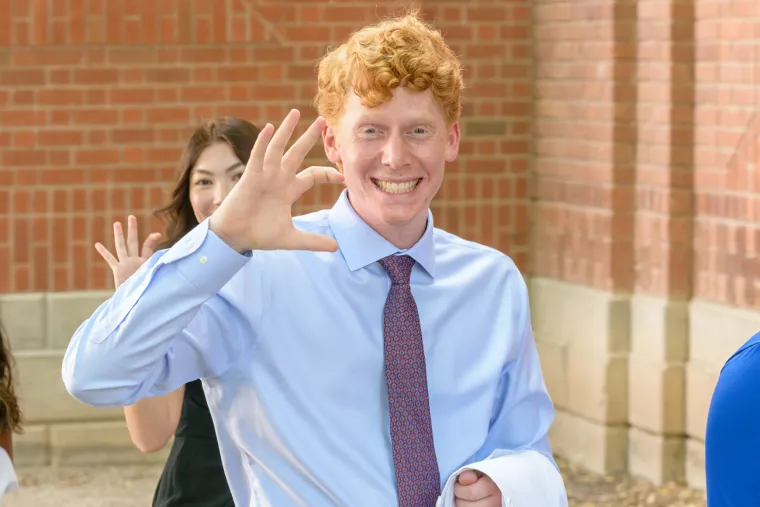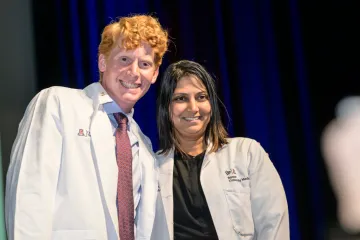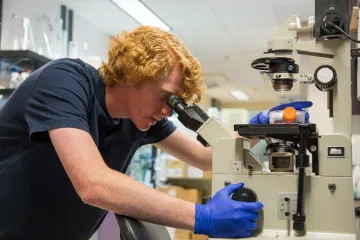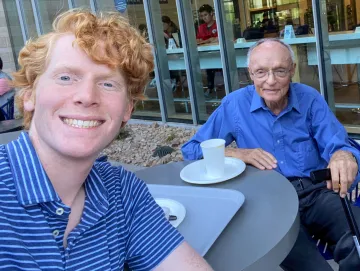Kyle Cook: ‘Here’s my first choice’
As a recipient of the Norman Koelling Scholarship, Cook is transforming his childhood wonder into a career as a healer.

Mitch Masilun
Phoenix native, third-generation Wildcat and soon-to-be double Wildcat Kyle Cook had two surgeries on his hand growing up: once in second grade when doctors removed a benign tumor, and again in high school when another one appeared on the other side of the joint. Cook had the same doctor both times, and his ability to relate to Cook made a positive impression.
“The doctor showing me images from the surgery, explaining things to me about how he operated on my hand, showing me the more personal and human side of medicine was important,” Cook says. “I really enjoyed my experience with him because he took the time to sit down and explain things to me. I was having fun listening to him tell me about the technicalities of surgery. It was really cool.”
When he enrolled at the University of Arizona as a first-year student, Cook knew he wanted to go into the health sciences. However, he was unsure if he wanted to be a physician, a physical therapist or a nurse.
“Coming into college, I had a general curiosity in the health sciences,” Cook remembers. “I thought it was my calling because I had some really cool personal experiences with health care.”
‘You get a taste of all the stuff you’re interested in’
Cook’s goals soon became clear: He would become a physician. Fortunately, the university had two incredible programs that helped forge his path — the physiology and medical sciences major, and the Honors Early Assurance Program.

Kyle Cook and his Societies mentor Serena Scott, MD, at the White Coat Ceremony for the Class of 2027
Kris Hanning
“The physiology program was a draw because being able to take courses that I was more interested in, like anatomy and physiology, was a lot more appealing than what I would be doing at Arizona State, like microbiology or something like that,” Cook explains.
The diversity in classes this program offers is a point of pride. There are emphasis areas for physiology, medical sciences, exercise and extreme physiology, and physiological research and innovation.
“We have different courses that are required in each of these areas, and each of them are more tailored,” says Claudia Stanescu, PhD, associate department head for education. “Someone who wants to go into medicine or become a physician assistant would pick medical sciences. If they wanted to do research they have that path. Exercise and extreme physiology is good for someone who’s interested in pursuing physical therapy or sports medicine.”
It’s these classes that help create well-rounded students who can succeed in many professions after college. The department also prides itself on the many extracurricular chances it offers.
“We offer a lot of opportunities for students to get involved in leadership positions and develop professional skills, which I think are important to be a well-rounded person and be able to succeed in any job, any direction that you choose to take after graduation,” Dr. Stanescu says.
‘Putting yourself out there’
Cook took full advantage of all the leadership and research opportunities afforded by the department. Cook was the president of the Physiology Club and works as an undergraduate researcher. He was first inspired to join the club as a freshman by two upperclassmen who themselves are now medical students at the University of Arizona College of Medicine – Tucson: Jacob Ref and Natalie Caryl.

As an undergraduate, Kyle Cook was a researcher at the Sarver Heart Center under the mentorship of Steven Goldman, MD, looking at regenerative therapies to treat heart problems.
Anna C. Christensen
Ref recruited Cook at an orientation event, and Caryl was the club’s president during Cook’s first year in the club. After positive experiences with the club as a freshman, Cook decided to serve on the board as the clinical chair, and eventually president.
“After being on the board for a year and wanting to stay there and apply to president, my main thing is I just want to give back like Natalie and Jacob and all these other people gave to me,” Cook says.
Cook’s extracurricular activities didn’t end with the Physiology Club. He also worked as an undergraduate researcher at the Sarver Heart Center under the mentorship of Steven Goldman, MD, professor of medicine, where he learned about regenerative therapies to treat heart problems in the future. Cook attended a research panel, of which Ref was a participating member, and found interest in the work.
“A big part about the whole undergrad experience is putting yourself out there and trying to learn about all these different things you can get involved in,” Cook says. “I didn’t know what research was, so I went to the research panel. After hearing a little bit more about what these other undergrads are doing, I started to understand more.”
‘I’m glad I decided to apply to HEAP’
As he came closer to completing his undergraduate studies, Cook realized he wanted to maintain his strong ties to the College of Medicine – Tucson. Hoping to stay here for medical school, he applied to the Honors Early Assurance Program and gained early admission to the college’s medical school before he finished his junior year.
“The fact that it’s early admission is so much of a blessing,” Cook says. “I’m glad I decided to apply to HEAP because it pushed me to do some things early and really manage my time well during my junior year.”
“The human nervous system inspires a sense of wonder in me.”
Cook remembers putting together his CV and personal statement and gathering letters of recommendation earlier than most other aspiring medical students. He buckled down and took the MCAT exam as a junior, an experience that taught him valuable time management skills. Once he was accepted to the College of Medicine – Tucson, it was a load off of his shoulders.
“I got admitted in April of my junior year,” Cook recalls. “Then I knew where I was going to be for the next five years and six months. I feel really thankful. There’s a lot of people, I would say most people, who don’t know where they’re going to be in five years.”
Cook is excited to have an opportunity to continue his studies in Tucson, a place where he learned what he wanted to be.
“After being here at the University of Arizona, and after all my undergraduate experiences, being involved in Physiology Club, and after having finally decided on wanting to be a physician and taking that path through the College of Medicine – Tucson, I thought, here’s my first choice,” Cook says.
‘Excited for the possibilities to come’
Now in the middle of his first year of medical school, Cook and his cohort started the neurology block in mid-October. As a naturally curious person, topics like the inner workings of the brain really speak to him.
“The human nervous system inspires a sense of wonder in me far greater than many other topics,” Cook says. “Learning how physiology can directly impact one’s emotional state or decision-making processes is completely incredible. One of the most significant things I have learned so far is how much I have taken the nervous system for granted until recently.”
When Cook finds a topic that truly inspires his curiosity to reach new heights, he can’t help but wonder about the first time someone figured out the material he learns in lecture.

Kyle Cook meets with Norman Koelling, PhD, the namesake of his scholarship
“I am often in awe of the many years of knowledge acquisition from thousands and thousands of people in the past that has culminated in my current medical training,” Cook says. “That leads me to doing some outside reading to learn even more about the scientific process that led to the finding. This train of thought inspires me, in part, to continue knowledge acquisition via research within the medical field and carry on the work of those who went before me and whose shoulders I stand on.”
One individual who came before Cook now helps the current generation. Cook recently learned he is the recipient of the Norman Koelling Scholarship, named for a former College of Medicine – Tucson anatomy lecturer who continues to give back to the college. This scholarship helps Cook continue his studies while encouraging him to look toward the future.
“Besides the basic level of financial support — which immensely helps — having received a scholarship that was made possible by the alumni of my college is quite inspiring,” Cook shares. “Thinking about all the places and specialties where our alumni have landed makes me excited for the possibilities to come. Thinking about our alumni keeps me enthusiastic about learning new things because it reminds me of all the many fields of practice and responsibility they are in, some of which I probably don’t even know about yet. Perhaps I will end up in a field of practice that I don’t even know exists yet!”

